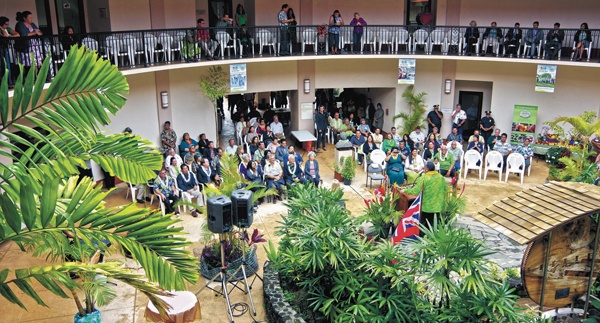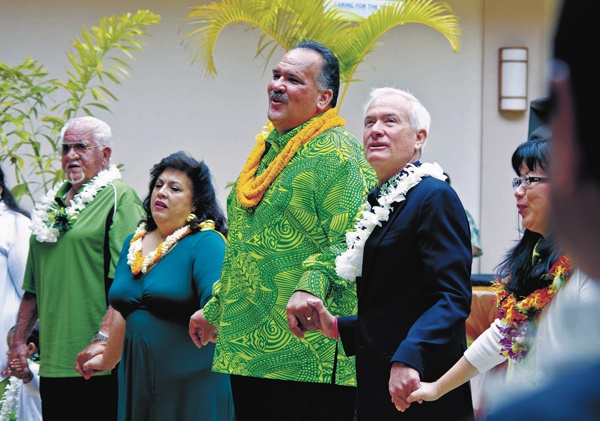LIHUE — When Kauai Mayor Bernard Carvalho Jr. delivered his administration’s budget recommendations last year, he spoke about the need to get back to basics by focusing on the county’s core functions like park and road maintenance. And this year,
LIHUE — When Kauai Mayor Bernard Carvalho Jr. delivered his administration’s budget recommendations last year, he spoke about the need to get back to basics by focusing on the county’s core functions like park and road maintenance.
And this year, he said, “will be more of the same” to address a reality that many local governments and households nationwide are facing every day: shrinking revenues and rising expenses.
“I look forward to this time every year when we can come together as a community and celebrate the truly wonderful things that are happening all around us,” Carvalho said on Monday as he delivered his State of the County address to nearly 75 people in the county’s Moikeha Building rotunda.
“It’s also a time to think seriously about the challenges we face,” he said. “Most of all, it’s a time to commit to working together to make things better for everyone on Kauai and Niihau.”
Part of the State of the County address is for the mayor to lay out his fiscal priorities and budgetary plan for the next year.
The cost of government has gone up over the past year, Carvalho said, and one of the contributing factors has been collective bargaining costs, which accounted for a $3.3 million increase during the current 2014 fiscal year.
Those costs, negotiated with all four county employee unions last year, will also include another $4 million in pay raises for the county’s 1,254 full-time employees during the 2015 fiscal year, which begins on July 1.
The raises, Carvalho said, represent the first ones received by employees from two of those unions since 2008.
“To deliver the services that you expect and deserve, we must have a well-trained workforce and our workforce must have the proper tools to get the job done,” Carvalho said. “And as costs increase, we must find ways to save money at every opportunity while also looking at how we can increase our revenues without overly burdening our taxpayers. It feels like an impossible task but it simply must be done.”
The raises make up a majority of the $4.6 million in spending increases proposed for the $180.6 million 2015 fiscal year, which begins July 1.
Other areas within the county that warrant spending increases, Carvalho said, are operational costs for the expanded Waimea wastewater treatment plant; green waste processing costs; and lease payments on eight new Kauai Police Department vehicles.
Additional funding, he added, will also be needed to purchase more equipment for the continued rollout of automated trash pick up services islandwide and provide weekend schedule service for The Kauai Bus on Thanksgiving Day, Christmas Day, and New Year’s Day.
But spending, Carvalho pointed out, doesn’t come without some cost-saving or cost-cutting initiatives.
During the 2014 fiscal year, county officials trimmed millions of dollars in operating expenses; delayed funding some capital improvement projects; placed a freeze on hiring new employees; and increased taxes and fees.
“We are not yet at the end game,” Carvalho said about the cuts. “To put it in football terms, we’re now on the 10-yard line and we have to push just a little bit more to get into the end zone. Our goal is to create a budget that is sustainable over time and we’re getting closer to that goal.”
To pay for the proposed budget increase some new fees are being pitched, including raising the hotel and resort class real property tax rate from $9 to $11 per $1,000 of valuation and the annual transient vacation rental (TVR) renewal fee from $500 to $750, a move that would offset an estimated 90 percent of the TVR program cost.
Not everyone is wild about raising taxes and fees to pay for the growing budget.
“Naturally, we would hope that the real property tax rate for the hotel/resort class would not increase,” Grand Hyatt Kauai Resort and Spa General Manager Jerry Westenhaver wrote in an email Monday about the mayor’s proposal. “The rate is already quite high, and would be a financial burden for all hotels on the island. The cost of doing business on Kauai is already very high and this would make it that much more challenging.”
Carvalho is also resurrecting a move from last year’s budget proposal to raise the county’s solid waste tipping fee from $90 to $119 per ton and the vehicle weight tax by $0.005 for commercial vehicles and $0.0075 for all others.
A bill to raise the vehicle weight tax was killed in a 5-0 vote by the Kauai County Council earlier this year. A separate bill to raise the county’s solid waste tipping fees has been deferred until April 23.
To account for collective bargaining increases over the next few years, Carvalho said his administration will look at ways to reduce payroll costs, which accounts, for two-thirds of the county’s budget.
“We must be disciplined when employees retire or leave the county,” Carvalho said. “Every vacancy must be scrutinized to determine if the position can go unfilled and whether the job can get done some other way, either by someone else in the department, through technology or by a joint effort among departments.”
A task force, Carvalho said, has also been assembled to create a centralized motor vehicle pool for every day county use that employees can access online to make reservations.
“The days of having vehicles assigned to every department are gone,” Carvalho said. “As our vehicles age, they will be taken out of service and they will not be automatically replaced.”
County officials, he added, are also embarking on other long-term, cost-saving initiatives, such as trimming the county’s annual streetlight costs, totaling about $1 million, by installing LED bulbs and pursuing technology to capture methane from the Kekaha landfill and fuel the county’s entire bus fleet and heavy equipment.
“Especially in these difficult times, our budget team and our department heads have worked very hard to make sacrifices and have been very creative in finding ways that we can get the job done with fewer resources,” Carvalho said. “And the team now extends to the County Council. They will be in the position to make the tough decisions on the budget, but we will be working closely with them so that those decisions are based on good, factual information.”
And the decision that some council members say they will face is not an easy one.
During the budget process, which will go before the council March 27, Councilman Ross Kagawa said he will focus on cutting government waste first before looking at how to generate more revenues for the county.
“It’s hard because we all have different priorities — we all have different things that are important to all of us,” Kagawa said about the budget process. “I think, for this year, it’s going to be extra tough because we no longer have that surplus already — it’s pretty much gone.”
Fellow Councilman Mel Rapozo agreed.
“I don’t think this year is going to be any different as far as the way we approach the budget but my position has always been no fee or tax increase unless it’s absolutely necessary,” Rapozo said. “Until I see what I believe is a satisfactory reduction of expenses, I’m not prepared to support any fee or tax increase.”
• Darin Moriki, county government reporter, can be reached at 245-0428 or dmoriki@thegardenisland.com. Follow him on Twitter at @darinmoriki.



